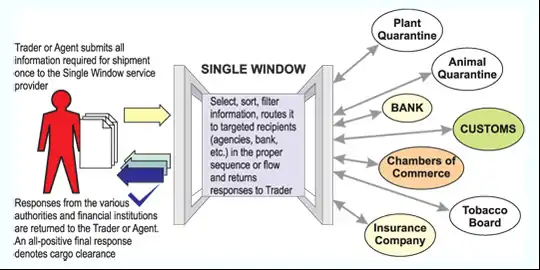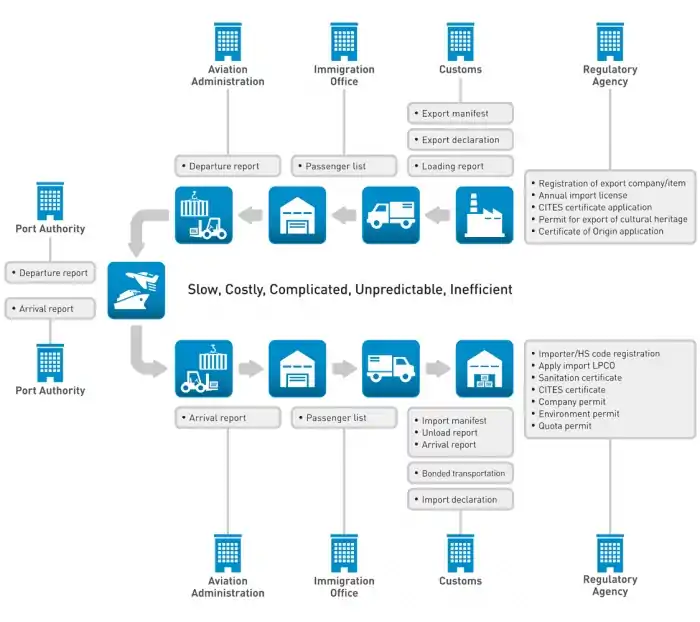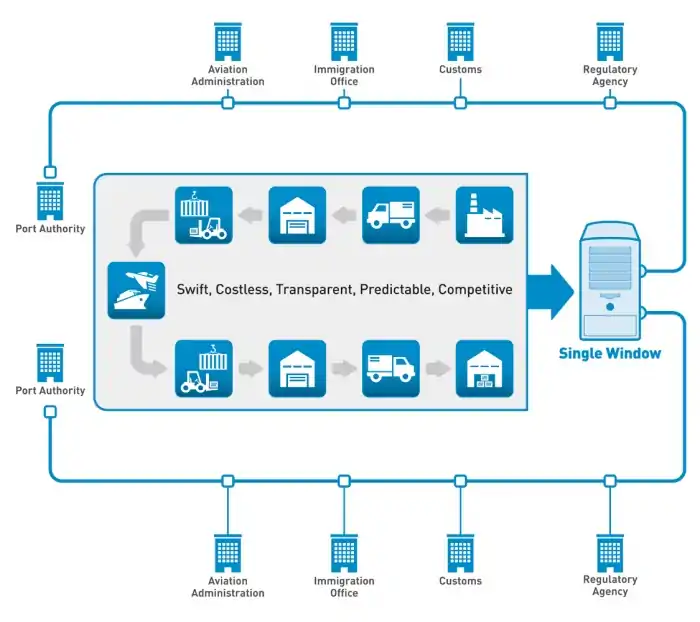Single-window system
The single-window system or single-window concept [1] is a trade facilitation concept which allows an international (cross-border) trader to submit information to a single agency, rather than having to deal with multiple agencies in multiple locations to obtain the necessary papers, permits, and clearances to complete their import or export processes. There is an obvious time saving benefit to the single window system. The concept is recognised by organisations such as the United Nations Economic Commission for Europe (UNECE) and its Centre for Trade Facilitation and Electronic Business (UN/CEFACT), World Customs Organization (WCO), the United Nations Network of Experts for Paperless Trade and Transport in Asia and the Pacific (UNNExT),[2] and the Association of Southeast Asian Nations (ASEAN).
Concept

The main value proposition for having a single window for a country or economy is to increase the efficiency through time and cost savings for traders in their dealings with government authorities for obtaining the relevant clearance and permit(s) for moving cargoes across national or economic borders. In a traditional pre-single-window environment, traders may have had to contend with visits and dealings with multiple government agencies in multiple locations to obtain the necessary papers, permits, and clearances to complete their import or export processes.
A common definition of the term "single window" is:
"A facility that allows parties involved in trade and transport to lodge standardized information and documents with a single entry point to fulfill all import, export, and transit-related regulatory requirements. If information is electronic then individual data elements should only be submitted once."[3]
The concept is recognised and promoted by several world organisations that are concerned with trade facilitation. Amongst these are the United Nations Economic Commission for Europe (UNECE) and its Centre for Trade Facilitation and Electronic Business (UN/CEFACT), World Customs Organization (WCO), the United Nations Network of Experts for Paperless Trade and Transport in Asia and the Pacific (UNNExT),[2] and the Association of Southeast Asian Nations (ASEAN).
As of 2022 Singapore, Sweden, the US and New Zealand currently have Single Window systems in place.[4]
The diagram below illustrates an example of an implementation of a Single Window system within a country or economy.
There are many actors and procedures required for international trade which may result in high costs and long waits. The reason why international trade needs practical support relatively more than domestic trade is the need for the inevitable controls of cross border regulatory Agencies (CBRAs).
These inevitable various controls can be carried out through the Single Window system, supported by information technology, and is an optimized process. A Single Window's benefits are shown in the following two diagrams, exemplifying trade with and without a Single Window:
 |
 |
|---|
Benefits
A single window service aims to deliver specific benefits to the main communities and stakeholders in cross-border trade:
- Government
- Customs
- Permit-issuing agencies
- Ministries (and other trade monitoring bodies) may be able to obtain cross-border trade-related data and statistics in a comprehensive and timely manner from the single window service provider
- Shipping and forwarding community
- Ship arrival notice
- IMO FAL forms:
- General declaration
- Cargo declaration
- Ship's stores declaration
- Crew's effects declaration
- Crew list
- Passenger list declaration
- Dangerous Goods
- Electronic ship clearance
- Shippers and traders
- Banking and insurance community
United Kingdom
The UK Government has committed £180 million to build a UK Single Trade Window, intending that "this will reduce the cost of trade by streamlining trader interactions with border agencies".[4] The proposal forms part of the government's 2025 UK Border Strategy, reflecting an ambition that the UK Border should be "the most effective in the world" in regard to both prosperity and security.[5] The proposal is expected to benefit small and medium-sized organisations in particular.[6]
References
- UNECE, UNECE brochure on the Single Window concept
- "UNNExT website".
- World Customs Organization, "The Single Window Concept" (PDF). Archived from the original (PDF) on 2007-03-17. Retrieved 2006-04-18.
-
 This article incorporates text published under the British Open Government Licence: Cabinet Office, UK Single Trade Window - discussion paper, updated 11 February 2021, accessed 18 June 2022
This article incorporates text published under the British Open Government Licence: Cabinet Office, UK Single Trade Window - discussion paper, updated 11 February 2021, accessed 18 June 2022 -
 This article incorporates text published under the British Open Government Licence: Cabinet Office, 2025 UK Border Strategy, published 17 December 2020, accessed 18 June 2022
This article incorporates text published under the British Open Government Licence: Cabinet Office, 2025 UK Border Strategy, published 17 December 2020, accessed 18 June 2022 - Hazlehurst, J., Brexit – why were 30% of businesses 'not at all prepared' for change?, published 18 February 2022, accessed 18 June 2022